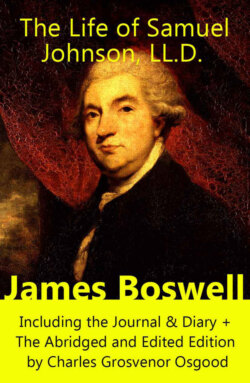Читать книгу The Life of Samuel Johnson, LL.D. - James Boswell - Страница 220
На сайте Литреса книга снята с продажи.
‘SIR,
Оглавление‘I did not expect to hear that it could be, in an assembly convened for the propagation of Christian knowledge, a question whether any nation uninstructed in religion should receive instruction; or whether that instruction should be imparted to them by a translation of the holy books into their own language. If obedience to the will of God be necessary to happiness, and knowledge of his will be necessary to obedience, I know not how he that with-holds this knowledge, or delays it, can be said to love his neighbour as himself. He that voluntarily continues ignorance, is guilty of all the crimes which ignorance produces; as to him that should extinguish the tapers of a light-house, might justly be imputed the calamities of shipwrecks. Christianity is the highest perfection of humanity; and as no man is good but as he wishes the good of others, no man can be good in the highest degree who wishes not to others the largest measures of the greatest good. To omit for a year, or for a day, the most efficacious method of advancing Christianity, in compliance with any purposes that terminate on this side of the grave, is a crime of which I know not that the world has yet had an example, except in the practice of the planters of America,[79] a race of mortals whom, I suppose, no other man wishes to resemble.[80]
‘The Papists have, indeed, denied to the laity the use of the bible; but this prohibition, in few places now very rigorously enforced, is defended by arguments, which have for their foundation the care of souls. To obscure, upon motives merely political, the light of revelation, is a practice reserved for the reformed; and, surely, the blackest midnight of popery is meridian sunshine to such a reformation. I am not very willing that any language should be totally extinguished. The similitude and derivation of languages afford the most indubitable proof of the traduction of nations, and the genealogy of mankind.[81] They add often physical certainty to historical evidence; and often supply the only evidence of ancient migrations, and of the revolutions of ages which left no written monuments behind them.
‘Every man’s opinions, at least his desires, are a little influenced by his favourite studies. My zeal for languages may seem, perhaps, rather over-heated, even to those by whom I desire to be well-esteemed. To those who have nothing in their thoughts but trade or policy, present power, or present money, I should not think it necessary to defend my opinions; but with men of letters I would not unwillingly compound, by wishing the continuance of every language, however narrow in its extent, or however incommodious for common purposes, till it is reposited in some version of a known book, that it may be always hereafter examined and compared with other languages, and then permitting its disuse. For this purpose, the translation of the bible is most to be desired. It is not certain that the same method will not preserve the Highland language, for the purposes of learning, and abolish it from daily use. When the Highlanders read the Bible, they will naturally wish to have its obscurities cleared, and to know the history, collateral or appendant. Knowledge always desires increase: it is like fire, which must first be kindled by some external agent, but which will afterwards propagate itself. When they once desire to learn, they will naturally have recourse to the nearest language by which that desire can be gratified; and one will tell another that if he would attain knowledge, he must learn English.
‘This speculation may, perhaps, be thought more subtle than the grossness of real life will easily admit. Let it, however, be remembered, that the efficacy of ignorance has been long tried, and has not produced the consequence expected. Let knowledge, therefore, take its turn; and let the patrons of privation stand awhile aside, and admit the operation of positive principles.
‘You will be pleased, Sir, to assure the worthy man who is employed in the new translation,[82] that he has my wishes for his success; and if here or at Oxford I can be of any use, that I shall think it more than honour to promote his undertaking.
‘I am sorry that I delayed so long to write.
‘I am, Sir,
‘Your most humble servant,
‘SAM. JOHNSON.’
‘Johnson’s-court, Fleet-street,
Aug. 13, 1766.’
The opponents of this pious scheme being made ashamed of their conduct, the benevolent undertaking was allowed to go on[83].
The following letters, though not written till the year after, being chiefly upon the same subject, are here inserted.
